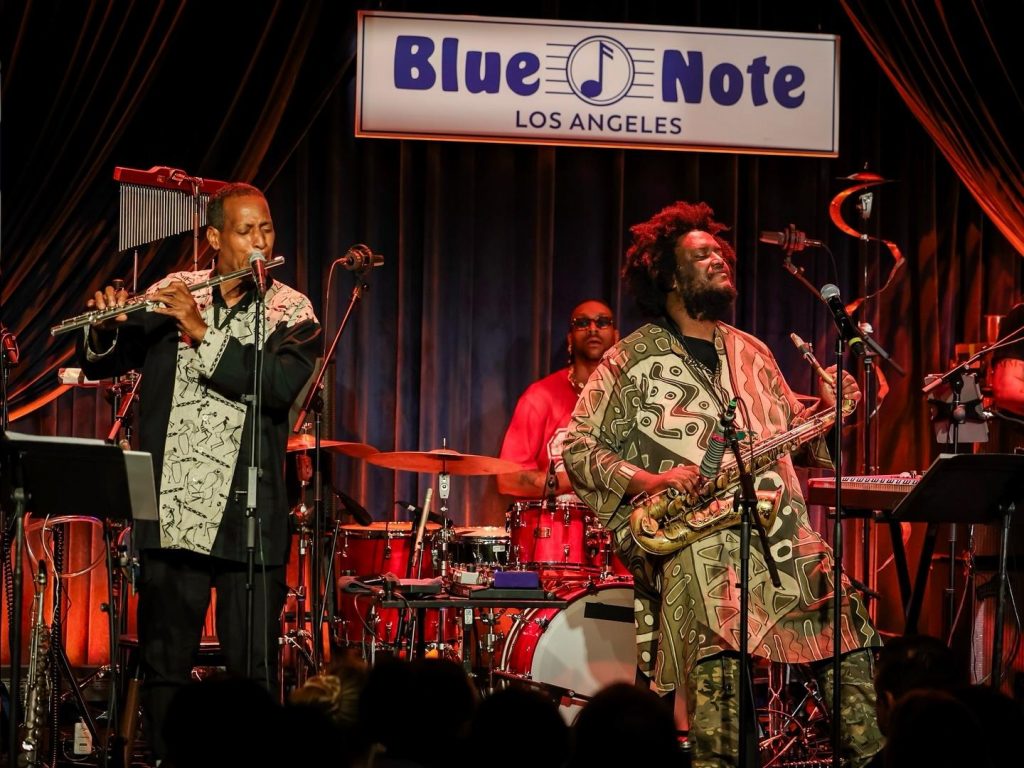Kamasi Washington is having a moment. This past summer, the composer, bandleader, saxophonist and musical son of Los Angeles staged an unprecedented “sonic blessing” at LACMA that attendees described less as a concert and more as a revelation. Over three evenings in late June, Washington transformed the museum’s new David Geffen Galleries—still empty of art—into a cathedral of sound. More than a hundred musicians in nine ensembles filled the 100,000-square-foot brutalist space with expanded arrangements from Washington’s 2018 EP Harmony of Difference. As sunset light poured through massive glass windows, visitors wandered while choruses morphed into ecstatic saxophone solos that dissolved into woodwind choirs. One critic called it “outright splendor.” Another said the whole building felt alive.
Kamasi Washington’s Los Angeles Takeover: LACMA to Blue Note
Washington’s higher-mind imagination also extended this year to Lazarus, Shinichirō Watanabe’s long-awaited anime return, where Washington joined Bonobo and Floating Points to score the Adult Swim series. For Washington, who obsessed over Watanabe’s Macross Plus as a teenager, the collaboration feels like cosmic justice, he’s said. Cosmic is a good word to describe the Lazarus album, too. Give it a listen.
And while Washington’s wily free-jazz version of “The Star-Spangled Banner” last month at the NFL season opener in São Paulo, Brazil, got roasted as “the worst national anthem ever”—an assessment I’d dispute—it showed how willing Washington is to break things open, consequences be damned.
Now he’s back home in Los Angeles and breaking into beauty all week at the new Blue Note club in Hollywood. Washington’s a Leimert Park kid who grew up as a member of Horace Tapscott’s Pan Afrikan Peoples Arkestra and playing at the beloved World Stage with its “make the music, serve the neighborhood” ethos.
On a much grander stage at the Blue Note, Washington is doing two shows nightly through October 12 with a full crew from the West Coast Get Down Collective, minus the illustrious Thundercat: Brandon Coleman on keyboards, keytar, and vocals; Ryan Porter on trombone; Miles Mosley on bass; Mike Mitchell on drums; and Patrice Quinn on vocals. Kamasi’s father, Rickey Washington—flute and sax player and his son’s first teacher—stands beside him, locked in and grinning, grounding it all in generational depth.
Blue Note Hollywood becomes Kamasi Washington’s jazz lab
From the moment Kamasi blows his first sax note, you sense that he’s tapped into something larger than himself. This is not jazz for the comfortable. The music is at times restless, coarse, blaring, unguarded and weird, which makes for an electrifying evening.
In a way, the set list is beside the point. Washington mixes things up each night, sometimes taking requests via Instagram. His long-form suites and modal vamps are arresting whether he’s wailing through opening sequence music from Lazarus or re-imaging a vintage groove like Terence Blanchard’s Malcolm’s Theme. The late shows push into uncharted territory—”You’ve kind of played everything that you can think of,” Washington told LAist, “so now you gotta try to tap into something that you couldn’t think of.”
If you get what Kamasi Washington is doing (and it will take about seven seconds to decide), you’ll want to come back night after night to see how each show varies. The Blue Note stage is Washington’s jazz laboratory. But what you’re hearing goes way beyond experimentation. It’s craft in service of transcendence, layered with joy and performed by an artist who understands that sometimes the only way forward is to refuse the path entirely.

